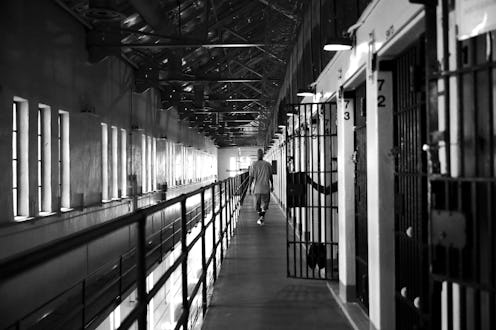News
Nearly Half Of Adults In The US Have A Relative Who Was Or Is Incarcerated, Study Says

There's a reason criminal justice reform has become a national topic: Nearly half of all adults have a family member currently or previously incarcerated, according to a new study from FWD.us and Cornell University. The study, called "Every Second: The Impact of the Incarceration Crisis on America’s Families," was published on Thursday. Researchers found that 113 million people have a relative either currently or previously incarcerated — and families of color are more greatly affected.
For 63 percent of Native American adults, at least one relative has spent a night or more in jail. That's compared to 63 percent of black adults and 48 percent of Latinx adults who also have had at least one relative previously incarcerated, according to the study. "Black adults are three times more likely than White adults to have had an immediate family member incarcerated for longer than one year," according to the researchers. "Latino adults are 70 percent more likely than White adults to have had an immediate family member incarcerated for longer than one year."
The poor are also disproportionately affected by mass incarceration. In households where the income is less than $25,000, adults are 61 percent more likely to have a relative incarcerated than those in households where the income is more than $100,000.
The Washington Post reported that while 1 in 7 adults had an immediate relative in jail or prison for at least one year, 1 in 34 adults have someone in their family who has been in prison for more than 10 years. Researchers estimated that 6.5 million American adults have an immediate relative who is behind bars.
"Despite limited recent declines in the jail and prison population, an unprecedented number of people continue to be impacted by incarceration, and the collateral consequences of that experience which can last a lifetime," the report stated.
While men are more likely to be those incarcerated, the researchers found "women are more likely to have experienced family incarceration." The study found that 48 percent of women have family members who are incarcerated compared to 42 percent of men.
The effects of mass incarceration among families don't stop once the person leaves jail or prison. Researchers found that the physical health of women with incarcerated family members "has been significantly or extremely affected" by their family member's incarceration. When asked about how their mental health was affected, 86 percent of women with incarcerated family said they were "significantly or extremely affected."
Additionally, 32 percent of women with incarcerated family saw the loss of their household's breadwinner. Nearly 70 percent of women with incarcerated family saw themselves become their household's sole wage earner. "Research has shown that even short periods of incarceration can be devastating to people’s lives and additional punishments such as fines and fees, restrictions on employment and housing, and the loss of basic human rights limit opportunities for success long after individuals have completed their sentences," the report stated.
Even more troubling is what the report doesn't cover. "There are an estimated 6.5 million adults with an immediate family member currently incarcerated in jail or prison (1 in 38)," researchers wrote. "Just under 40 percent of these people reported that there are children under 18 in their household, suggesting the overall number of people experiencing family incarceration is much higher than our estimates which only include adults."